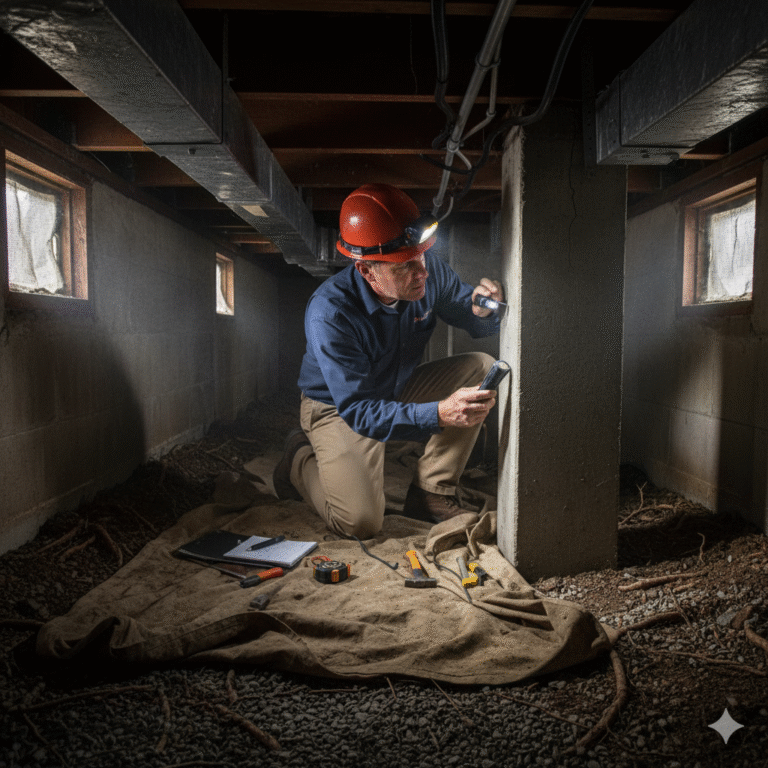Foundation Inspection Timing and Warning Signs

Your home’s foundation is one of the most important parts of your property. It’s the base that supports everything else—your walls, floors, plumbing, and roof. If your foundation begins to show signs of stress or movement, including cracks, uneven floors, or other signs, it can lead to costly repairs, compromise structural integrity, and even pose health and safety concerns.
Knowing when to get a foundation inspection is essential to protect your home from foundation damage, catch potential issues early, and preserve the value of your property. This guide outlines the warning signs, the best timing for an inspection, and what to expect from a foundation inspector.
Why Foundation Inspections Matter
Your foundation supports every part of your house—so when something goes wrong, it can affect everything from your floors and walls to your windows, doors, and even your plumbing.
Over time, soil movement, weather changes, poor drainage, and plumbing leaks can lead to shifting, cracking, or settling.
Regular foundation inspections help identify these issues before they result in extensive damage or threaten your home’s structural integrity.
When to Get a Foundation Inspection
If you’re asking yourself, “Do I need to get a foundation inspection?”—here are some common situations where the answer is a clear yes:
1. You Notice Warning Signs Around Your Home
Look for these early signs of foundation problems:
- Cracks in walls, floors, or ceilings.
- Sticking doors or windows.
- Uneven or sloping floors.
- Gaps between baseboards or ceiling trim.
- A leaning chimney or bowing basement wall.
- Excess moisture or a wet crawl space.
These indicators point to foundation movement, poor drainage, or other structural issues. They should never be ignored.
2. Before You Buy or Sell a Home
A professional foundation inspection for a home purchase is a smart move. A buyer will want proof that the foundation is structurally sound, and sellers benefit from early identification of foundation problems that could delay or jeopardize a sale. Including a foundation inspection report as part of your documentation can build confidence and transparency.
3. Every 5–10 Years for Preventive Maintenance
Many foundation experts recommend annual inspections in high-risk areas, or every 5–10 years as part of your home’s maintenance routine. Homes with beam foundations, crawl space designs, or concrete foundations located near clay-heavy soil are particularly susceptible to shifting and moisture intrusion.
4. After Major Weather Events or Plumbing Failures
Heavy rains, droughts, flooding, and plumbing failures can cause sudden or delayed foundation movement. If you’ve had a burst pipe, water pooling near the foundation, or noticeable moisture in your crawl space, it’s time to schedule a foundation inspection.
5. Before a Major Renovation or Structural Addition
If you’re remodeling or building onto your home, you’ll want to ensure your foundation is capable of supporting the extra weight. A professional evaluation helps prevent real problems during or after construction and ensures you comply with local building codes.
What Happens During a Foundation Inspection?
When you get a foundation inspection, a qualified foundation inspector will examine your home for visible and hidden signs of distress. Here’s what to expect:
Exterior and Interior Review
The inspector checks for:
- Foundation cracks.
- Sagging or uneven floors.
- Shifting or leaning walls.
- Gaps around windows and doors.
- Moisture in basements or crawl spaces.
Use of Tools and Measurements
Specialized tools—such as zip levels or laser levels—measure elevation changes, which can indicate foundation settlement or structural shifting.
Foundation Inspection Report
After the inspection, you’ll receive a detailed report outlining:
- The condition of your foundation.
- Any foundation problems.
- Recommended repairs.
- A cost estimate, if needed.
If the inspector suspects severe foundation movement or structural damage, they may recommend hiring a licensed structural engineer for a more in-depth assessment.
Common Signs of Foundation Problems
-
Cracks in Walls or Floors
Not all cracks are serious, but if they’re wider than 1/8 inch, run horizontally, or form stair-step patterns in brick or block, they could indicate foundation stress. -
Uneven or Sloping Floors
If things roll across your floors without help, or you notice dips and soft spots, your foundation may be shifting or settling unevenly. -
Sticking Doors and Windows
As your foundation moves, the frame of your house can twist, affecting the function of doors and windows. -
Moisture in the Basement or Crawl Space
A wet crawl space, musty odors, or mold are all signs that water is reaching areas it shouldn’t—and that your foundation may be compromised.
Can You Inspect Your Foundation Yourself?
As a homeowner, you can and should regularly inspect your property’s foundation to catch early signs of trouble. A simple visual walkaround may reveal a range of issues—such as shifting walls, cracked exterior brick, or separation at the edge of the concrete foundation.
For example, noticing cracks or uneven floors can help you search for the root cause of foundation problems. However, don’t forget that these DIY checks are only the first step. Only a trained home inspector can thoroughly examine the foundation, diagnose the problem, and recommend the right course of action.
How Much Does a Foundation Inspection Cost?
Foundation inspection cost depends on the type of evaluation:
- Basic Contractor Inspection: Often free or low-cost, especially when you’re already considering foundation repairs. You can learn more about our foundation repair services here.
- Structural Engineer Inspection: A more detailed evaluation performed by a licensed structural engineer, offering an in-depth assessment of your foundation’s condition and recommendations for any necessary repairs. The complexity of the inspection depends on your home’s specific issues and location.
Investing in a reliable foundation inspection today can save you thousands in repairs down the line. It’s a smart use of your time and money.
FAQs
1. How often should I have my home’s foundation inspected?
Perform a visual check annually and have your foundation professionally inspected every 5–10 years or after major weather events. Factors such as home age and soil affect inspection frequency.
2. What’s typically included in a foundation inspection report?
The report details the condition of foundation materials, signs of movement or damage, potential issues, repair options, and cost estimates.
3. Is a structural engineer always required for foundation inspections?
Not usually. A home or foundation inspector handles most cases, but a structural engineer is needed if extensive damage or structural concerns are found.
4. Can foundation problems affect my plumbing system?
Yes. Foundation movement can cause plumbing leaks or damage, especially in slab homes, impacting your home’s material and structure.
5. Will insurance cover the cost of foundation repairs?
Typically not, unless damage is from a covered event like a burst pipe or natural disaster. Always check your policy for details.
Don’t Let Foundation Issues Go Unchecked
Ignoring foundation problems won’t make them go away—they tend to worsen over time and increase the cost and scope of repairs. If your home is showing signs of shifting or stress, don’t wait until you’re dealing with extensive damage.
Every crack tells a story. The question is: Is it harmless, or the start of something serious?
What Our Customers Say
⭐⭐⭐⭐⭐
Michelle Donohoe
“I cannot express how grateful we were to Appalachian Foundation Services for fixing our crumbling dirt walls and saving our foundation from falling in. We had a structural engineer give us a plan, but AFS provided a more structurally sound solution while preserving access to critical areas. Their team also sistered joists and removed an old cast iron furnace—all with great care and professionalism. Highly recommended!”
⭐⭐⭐⭐⭐
Griffin Brown
“The inspection process was very informative, low-pressure, and honest. They took on items other contractors wouldn’t touch and addressed all my concerns along the way. From joist sistering to crawl space repairs and even a window well installation, AFS exceeded my expectations. Definitely recommend at least having them inspect your space.”
Contact Appalachian Foundation Services for Peace of Mind
At Appalachian Foundation Services, our experienced team is here to help you identify, evaluate, and address foundation issues before they become major problems.
Whether you’re a buyer, a long-time homeowner, or somewhere in between, we’re ready to provide:
- Thorough, honest inspections.
- Clear, detailed reports.
- Affordable and effective foundation repairs.
- Solutions that meet all relevant building codes
.
Don’t let your home’s stability fall out of sight.
Contact Appalachian Foundation Services today at (540) 251-4391 or visit our contact page to schedule your foundation inspection and keep your home structurally sound for years to come. Learn more about our company here.

